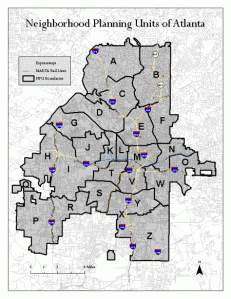Atlanta Watershed is in the 30% design phase for the North Fork Sewer Relief Project to replace and nearly double in capacity the trunk line beginning from approximately where the North Fork converges with the South Fork Creek up to approximately Shady Valley Dr. and Converse Dr. area along Buford Hwy and Dekalb County border. The trunk line to be replaced appears to be mostly along the west side of the Creek along I85 approximately along the Meadow Loop and Cheshire Farm trails. Another phase of this project is a proposed high flow event storage tank at one of several locations proposed on GDOT owned property along Sidney Marcus and Buford Hwy. This tank is much like the one installed a few years ago along the South Fork Peachtree Creek. Atlanta Watershed plans to host public comment meetings as the project moves forward from the design phase.
Below is an excerpt from the Watershed November Newsletter:
EPA Announces $61.9 Million Loan to Atlanta to Improve Wastewater ManagementNationally, 36 WIFIA loans are helping finance more than $15.2 billion in water infrastructure projectsU.S. Environmental Protection Agency (EPA) Administrator Andrew Wheeler announced a $61.9 million Water Infrastructure Finance and Innovation Act (WIFIA) loan to the City of Atlanta to help finance the construction of the North Fork Peachtree Creek Tank and Pump Station. This WIFIA loan represents the first loan provided under a master agreement with the city that will commit $216.8 million in WIFIA assistance over the next five years to help improve wastewater and stormwater management and benefit public health, water quality, and the environment.“WIFIA is playing a critical role in President Trump’s commitment to upgrade our nation’s infrastructure, improve public health and the environment, and create good-paying, local jobs,” said EPA Administrator Andrew Wheeler. “This project will reduce the volume of sewer overflows along the entire length of the Peachtree Creek sewer system and is only the first part of an agreement with Atlanta that will commit well over $200 million in WIFIA assistance over the next five years.”EPA’s WIFIA loan will help finance the construction of the North Fork Peachtree Creek Tank and Pump Station, an off-line temporary 15-million-gallon capacity storage tank for peak wet weather sewage flow. During significant wet weather events, peak flow will be diverted from the North Fork trunk sewer to the off-line storage tank. This project will significantly reduce the number and volume of sewer overflows along the entire length of the Peachtree Creek trunk sewer system, including eliminating sewer overflows during very large storms and smaller back-to-back storm events. By increasing sewer storage capacity and reducing sewer overflows, the project will protect public health and improve water quality in Peachtree Creek.“EPA is proud to support the Atlanta’s efforts to modernize and upgrade their wastewater infrastructure,” said EPA Region 4 Administrator Mary S. Walker. “Through WIFIA, EPA is investing in crucially important local projects, which will result in a cleaner environment, improved public health, new jobs and a stronger economy.”“The City of Atlanta’s Department of Watershed Management is extremely grateful to have been awarded a WIFIA loan to fund the very vital North Fork Storage Tank and Pump Station project,” said Commissioner for the City of Atlanta’s Department of Watershed Management Mikita Browning. “The capacity relief project will alleviate sewer overflows, add needed system capacity, and aid in continued compliance with our consent decrees.”WIFIA is providing financial support at a critical time as the federal government, EPA, and the water sector work together to help mitigate the public health and financial impacts of COVID-19. This project phase will cost $126.4 million and EPA’s WIFIA loan will finance nearly half of that figure. The remaining project funds will come from the City of Atlanta. The WIFIA loan will save the City of Atlanta an estimated $25.2 million, while project construction and operation are expected to create 400 jobs. Since March 2020, WIFIA has announced twenty loans and updated five existing loans with lower interest rates, saving ratepayers over $1.3 billion.For more information about the WIFIA program’s accomplishments through 2019, visit: https://www.epa.gov/newsreleases/epa-announces-first-wifia-annual-report-highlighting-35-billion-infrastructure-funding.For more information about the WIFIA program, visit: https://www.epa.gov/wifia.





 February’s weather cost the Georgia DOT contractor two weeks of work on flyover ramps linking Interstate 85 to SR-400. Traffic on Cheshire Bridge Road and Lindbergh Drive will keep dodging construction barrels at least until April.
February’s weather cost the Georgia DOT contractor two weeks of work on flyover ramps linking Interstate 85 to SR-400. Traffic on Cheshire Bridge Road and Lindbergh Drive will keep dodging construction barrels at least until April. With the indictment of Burrell Ellis, new calls have come for a shift to
With the indictment of Burrell Ellis, new calls have come for a shift to